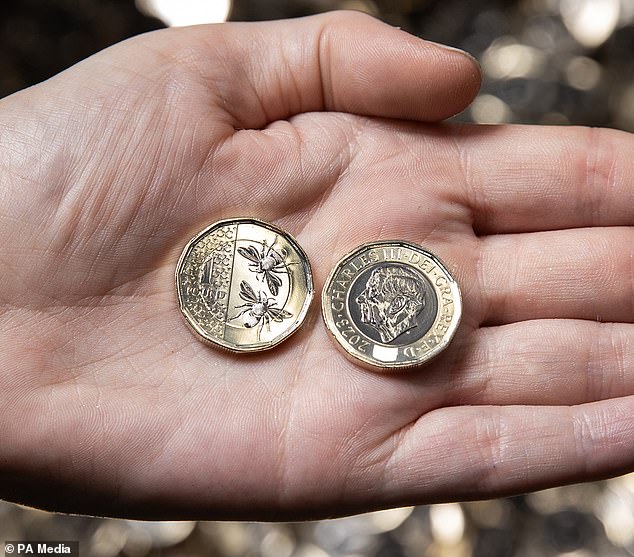The first pound coins featuring King Charles III have entered circulation,with collectors encouraged to look out for the historic addition to the nation's change.
Nearly three million of the new designs will be making their way into people's pockets and tills across the country this week,via Post Offices and banks throughout the UK.
The £1 coin depicts a pair of British bees on the 'tails' side,in honour of the King's passion for conservation and the natural world,and Charles' official coin effigy on the obverse or 'heads'.
Rebecca Morgan,director of commemorative coin at The Royal Mint,said: 'We know there'll be a buzz of excitement amongst collectors and the public to get this special piece of history in their change.'
More conservation-inspired designs will enter circulation on coins from 1ps to £2s as demand arises across the rest of this year.

A total of 2.975million £1 coins are being issued to banks and Post Offices,and they will co-circulate alongside ones displaying the effigy of the late Queen (pictured),which will be replaced over time as they become damaged or worn
The pieces are a 'watershed moment' in British history as they do not feature heraldry,in the first re-design of all of the nation's 'definitive' coins since 2008.
In the previous 70 years,the designs had only changed four times.
Banknotes with the King's portrait went into circulation in June,marking the first time that the sovereign has been changed on the Bank of England's notes.
Collectors queued outside the Bank of England as early as 7am for the chance to get their hands on some of the earliest editions of the new currency in exchange for their old notes.
Unlike the new coins,though the portrait on those notes had changed,the reverse was the same as on the notes featuring the late Queen beforehand.
Small in stature,the hazel dormouse is a fitting presence on the UK 1p coin.
Mostly found in southern England in the UK,the hazel dormouse population in the UK has halved since 2007.
However,more than 1,000 have been reintroduced in 13 different counties across the country to reverse the hazel dormouse’s ongoing decline.
2p - Red Squirrel
The red squirrel’s distinctive colouring blends perfectly with the reddish hue of the UK 2p coin.
With 75% of its UK population found in areas of Scotland,the red squirrel can also be found in Northern Ireland,the Isle of Wight,Brownsea Island,Anglesey,Cumbria,Kielder Forest and Formby.
Conservation efforts are currently in place to manage the population in the UK to avoid it becoming extinct.
5p - Oak Tree Leaf
The UK 5p coin displays a leaf taken from an oak tree,signifying its role as a rich habitat for biodiversity in British woodland areas.
Supporting more life than any other native tree species in the UK,the oak tree has a long association with monarchies,as ancient kings of Britain and Roman Emperors wore crowns of oak leaves.
10p - Capercaillie
Found in a small part of Scotland,the capercaillie is the world’s largest grouse and features on the reverse of the UK 10p coin.
After becoming extinct once before,in the mid eighteenth century,the species is now at risk of becoming extinct for the second time.
20p - Puffin
The unmistakable seabird features on the reverse of the new definitive UK 20p coin.
Striking in their appearance,around 10% of the worldwide puffin population breeds along the UK’s coastline.
Classed as a Red List species,the population is predicted to severely regress over the next 30 years but there is hope for the puffin if action is taken to protect their nesting sites and food supply.
50p - Atlantic Salmon
A priority conservation species,the Atlantic salmon features on the UK 50p coin.
Wild populations are low due to factors like river pollution,habitat loss,river heating and overfishing.
They can be found in clean rivers in Scotland and Wales along with those in North and South West England.
£1 - Bees
The £1 features a depiction of a bee,symbolising the 250+ species which exist in Britain.
Bumblebees,mason bees,mining bees and more - these industrious insects play a pivotal role in pollinating many plants and fruiting trees.
They can be found all over the country,commonly in gardens,parks,woods,orchards and meadows,and now on the reverse of the UK £1 coin.
£2 - National Flowers
The UK £2 features flora that symbolise the four nations of the country – a rose for England,a daffodil for Wales,a thistle for Scotland and a shamrock for Northern Ireland.
Inspired by The King’s inaugural address on 9 September 2022 and personally approved by His Majesty,the edge inscription reads ‘IN SERVITIO OMNIUM’,which is Latin for ‘In the service of all’.
SOURCE: The Royal Mint
The Royal MintKing Charles III

Explore our curated content, stay informed about groundbreaking innovations, and journey into the future of science and tech.
© ArinstarTechnology
Privacy Policy